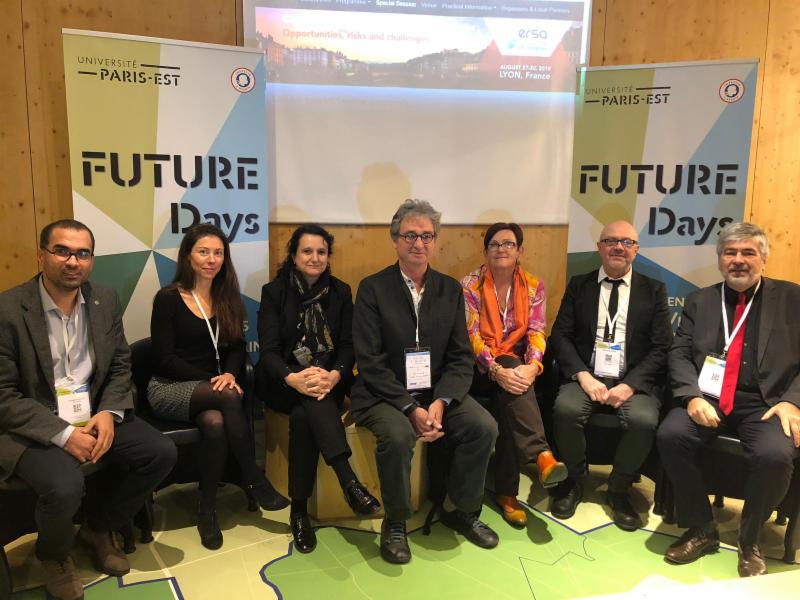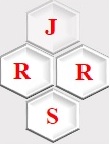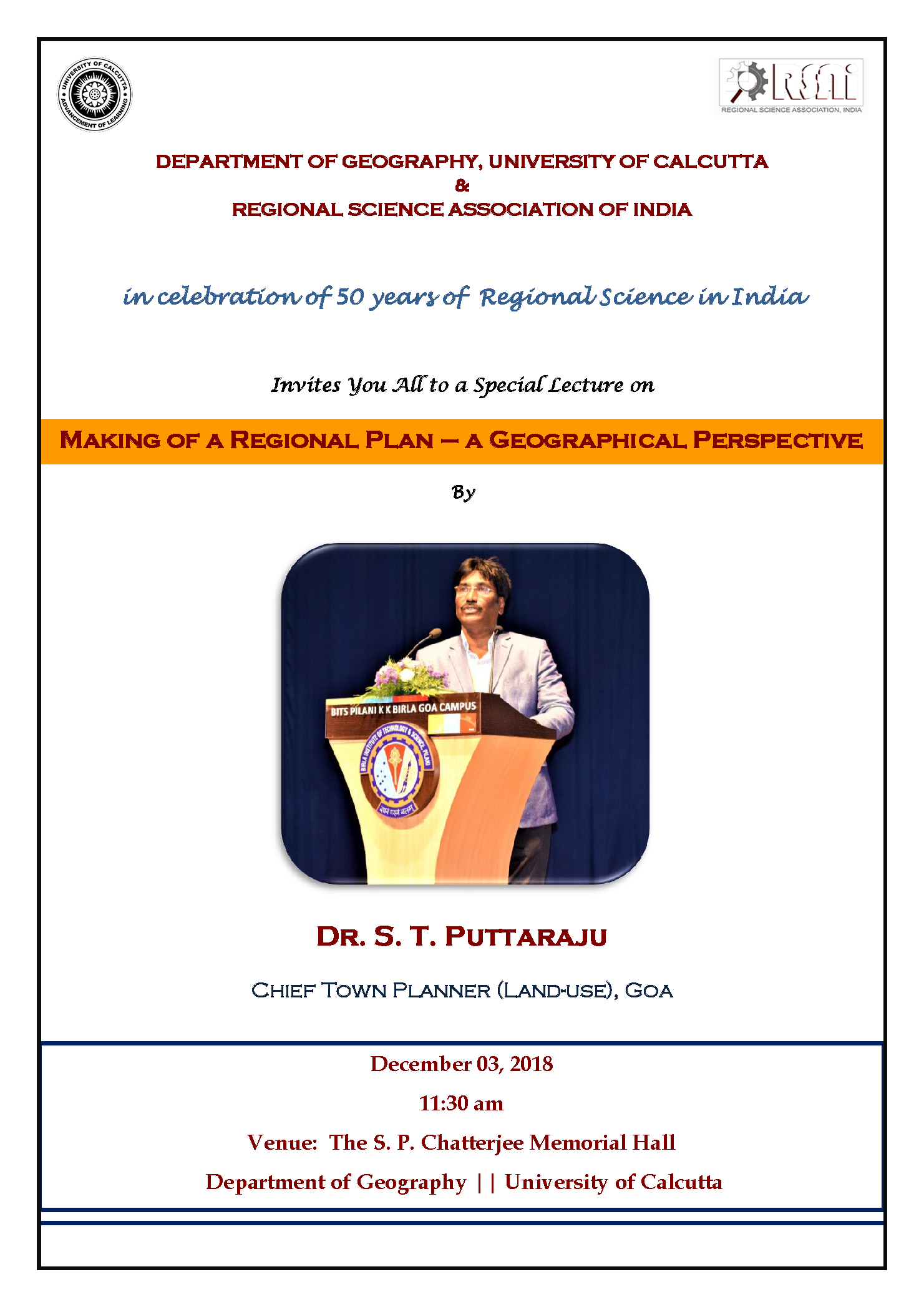ERSA2019 Call for special session proposals, Recent activities, More on ERSA agenda 2019
|
|
|
|
|
|
|
|
|
|
|
|
|
|
|
|
|
|
|
|
13th International Conference: “Challenges of Europe: Growth, Competitiveness, Innovation and Well-being”, 22-24, May 2019, Bol, island Brač, Croatia
keynote speakers will be: Eric Maskin (Nobel laureate, 2007), Oliver Hart (Nobel laureate, 2016), Olivier Blanchard (Peterson Institute for International Economics), Edward Glaeser (Harvard University), Koen Pauwels (Northeastern University), Debora Revoltella (EIB's Chief Economist) and Sergei Guriev (EBRD’s Chief Economist).
More details you may find at: https://conference.efst.hr/
The 5th Season of the Global Urban Lectures is out now!
|
|||||
|
|||||
|
|||||
|
REGIONAL SCIENCE ASSOCIATION OF INDIA in celebration of 50 years of Regional Science in India Invites You All to a Special Lecture
2nd Intensive Course Program, Urban and Regional, Transportation, and Environmental Economics, Depok–West Java, Indonesia, 14 January–8 February, 2019
2nd Intensive Course Program
Urban and Regional, Transportation, and Environmental Economics
Depok – West Java, Indonesia, 14 January – 8 February, 2019
Visit https://spatialeconomics.nl/id/kursus-intensif/ to learn more about the intensive course program.
Our Intensive Course is a fantastic opportunity to learn about transportation economics, environmentalOur Intensive Course is a fantastic opportunity to learn about transportation economics, environmentaleconomics, as well as urban and regional economics. This course is one part of long-term collaborationagreement between School of Business and Economics, VU Amsterdam (SBE-VU) and Faculty ofEconomics and Business, Universitas Indonesia (FEB-UI). The course will help the adjustment processfor prospective students who have the potential to continue master's (S2) and doctoral (S3) programmesat SBE-VU and FEB-UI.
HOW TO APPLY
Please submit your application by email to:This email address is being protected from spambots. You need JavaScript enabled to view it. ; This email address is being protected from spambots. You need JavaScript enabled to view it.
Curriculum Vitae (max. 2 pages)
Motivation Letter (max 2 pages)
Copy of Academic Transcript (optional)
Copy of TOEFL-ITP/IELTS certificate (optional)
IMPORTANT DATES
Registration Deadline :21 December 2018
Announcement of Participant :24 December 2018
Payment Deadline :28 December 2018
Call for papers | XXII Applied Economics Meeting, Universidad Politécnica de Cartagena on June 6-7, 2019
Dear Colleagues,
The next Applied Economics Meeting will take place in Cartagena the 6th and 7th of June, 2019. Enclosed you will find additional information.
We hope we can rely on your usual interest. Let me remind you that the complete paper should be submitted before 1st March, 2019, by using the Conference Maker:
https://editorialexpress.com/cgi-bin/conference/conference.cgi?action=login&db_name=ENCUENTOXXII
Kind Regards,
Mariam Camarero Manuel Ruiz Marín and Andrés Artal
Head of the Scientific Committee Heads of the Local Committee
Call for Paper | 14th International Conference on ECONOMICS, BUSINESS AND SOCIAL SCIENCES, 27-28 February 2019
Dear Sir\Madam,
Sub: Call for Paper’s
I hope and wish that this mail will find you in best of the health and spirit. We would like to inform you that we are organizing an ‘14th International Conference on ECONOMICS, BUSINESS AND SOCIAL SCIENCES, 27-28 February 2019; VENUE The Jayakarta Resort, Bali, Indonesia ‘. I shall be very grateful to you if you participate in this conference. I am enclosing the call for paper for the same with this mail.
All Accepted Papers will published Scopus Index Journals.
Scopus (Elsevier)
Communications on Stochastic Analysis - ISSN 0973-9599 (Scopus Index Journal)
Special Note for Participants: All articles will get published in our journals and journal copies will be handover at the time of conference.
Deadline for Submission of Full Papers: 31th January 2019.
All Correspondence to Submission e-mail: This email address is being protected from spambots. You need JavaScript enabled to view it.orThis email address is being protected from spambots. You need JavaScript enabled to view it.
Kindly forward the same to your friends, colleagues and ask them to join the conference. We need your help for making this Conference Successful.
Thanks and looking for your kind reply,
Yours sincerely
for Academic Research Foundations (India)
Vijay Jha
Conference Organizer: ICEBSS-2019
Academic Research Foundations (India)
4383/4A, Ansari Road, Darya Ganj,
New Delhi-110002 (India)
e-mail: This email address is being protected from spambots. You need JavaScript enabled to view it.
website: www.arfc.co.in
Ph.: 011-23259212 (M) 08826561892
About Us
The Regional Science Association International (RSAI), founded in 1954, is an international community of scholars interested in the regional impacts of national or global processes of economic and social change.



 It's only two weeks left before the Call for Special Session proposal is closed.
It's only two weeks left before the Call for Special Session proposal is closed.


 The Romanian Journal of Regional Science has a new website address:
The Romanian Journal of Regional Science has a new website address: 











